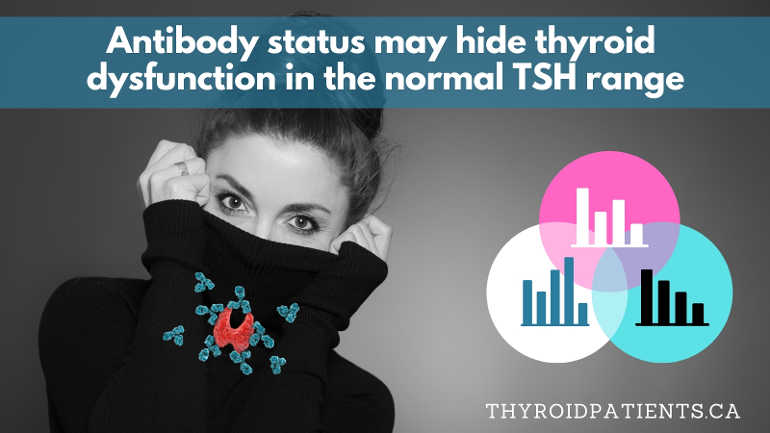Latest article on Thyroid Patients Canada:
Antibody status may hide thyroid dysfunction under a normal TSH
This article is part of a series of examples that illustrate why a normal TSH cannot rule out thyroid disease or dysfunction.

Latest article on Thyroid Patients Canada:
Antibody status may hide thyroid dysfunction under a normal TSH
This article is part of a series of examples that illustrate why a normal TSH cannot rule out thyroid disease or dysfunction.
Ah, a lovely post hel, and exactly why thyroid antibodies matter 😉
If there are so many factors affecting TSH and making it unreliable, the medical profession should test Free T3.
In my opinion my Free T3 has always been a better indicator of my wellness/illness than my TSH.
🤯
From the article, which reminds me that positive antibodies mean Hashimotos but negative antibodies mean nothing!
Very relevant as I continue to monitor my daughter, now 18, after 2 years of fatigue, iron anemia and ambiguous TSH and Free Ts.
|
TPOAb-positive autoimmunity is the most common type because immunoassays for these antibodies are readily available. The epidemic of Hashimoto’s in iodine-replete regions has led to a biochemical stereotype of hypothyroidism itself. Physicians and scientists now seem to imagine that all forms of hypothyroidism — autoimmune or not — will amplify TSH to the same degree that it does in Hashimoto’s thyroiditis, so that as FT4 falls below range, TSH rises over an arbitrary threshold of 10.0 mU/L.
Alas, if a person does not have TPOAb antibodies amplifying their TSH and it remains in the “subclinical” TSH zone, antibody-naive physicians will imagine they have a “milder” degree of hypothyroidism than a patient with Hashimoto’s. But in fact, their FT4 and FT3 levels may be just as low, or lower, than a person with Hashimoto’s with an elevated TSH who is offered treatment. The arbitrary 10 mIU/L threshold between different “grades” of subclinical hypothyroidism has been biased by TPOAb.
If a hypothyroid individual has TPOAb-negative status, a person’s TSH may be prevented from rising above of the “normal” range. It will look like they don’t have hypothyroidism at all.
This explains (from what I can make out) why so many of us don’t get a diagnosis often for decades.
No wonder these endocrinologists can’t cope. How long til this hits everyday use?
arTistapple
How long is a piece of string?
I think the main problem is their identification as ‘antibodies’ as opposed to the ‘auto-antibodies’ they are.
Antibodies are a much needed part of a normal immune response whose aim is to return us to good health, where as auto-antibodies are the result of an unwanted ‘self- attack’ and are themselves forms of a long term inflammation, eg most people with autoimmune disease will be suffering some form of chronic inflammation that risks inviting further.
The influence we see thyroid antibodies can make to our test results also extends to possibly impairing how our thyroid hormone replacement meds work. A good endo not only has to hold good understanding of thyroid physiology but also of the immune system. There’s no doubt many Hashi/Graves patients are more informed than their medical practitioners.
That’s because patients are the ones having to live with this horrible condition and woe betide you if you try to educate them…
I have no hope of this happening in my lifetime. In fact I have now decided that endos (medics) are extremely clumsily tripping over themselves. They are not open minded and therefore anything which should/could be opening their minds just is not. Some of the better practitioners/researchers are re-doing, re-researching what has been known for centuries. I can see how this would be useful, particularly in the political climate created by lazy, power seeking not so bright ‘leaders’ but what a waste of time when there is such good research already available to be further generated. I can only think it’s beyond them.
Endos should leave the real research to those with the really enquiring minds and concentrate on some simpler stuff. E.g. dosage. Something to help patients not hinder them.
Radd thanks for that. That was a much clearer explanation than I could possibly have managed. My point (unclear -clearly) was that for many of us, our own system of antibodies are working away keeping us as healthy as possible under the circumstances, even whilst the auto antibodies are doing their thing. I think that explains timing and influence of auto antibodies and why many of us fly ‘under the radar’ for longer than others.
E.g. My background (from the highest concentration of hypos certainly in the UK) is speculated to have developed from famine and starvation in the Highlands of Scotland and Ireland. This ‘deviant’ genetic background developed to protect us. It developed in such a way that even our ‘normal’ antibodies could take this into account.
Very Darwinian. Anyway, just thinking.
thank you for posting a great article. I love data. In a low-key way I’ve been trying, with little success, to find data relating to tsh/ ft4/ft3 /antibody values for pre- and/or undiagnosed symptomatic thyroid/ b12 people, similar to the symptom-free tsh test range graph. I’m looking forward to reading this article in more detail next week when I’ve a bit more space.
Very interesting article thank you
Wwwdot looks good - can you read through it for me pls? xx